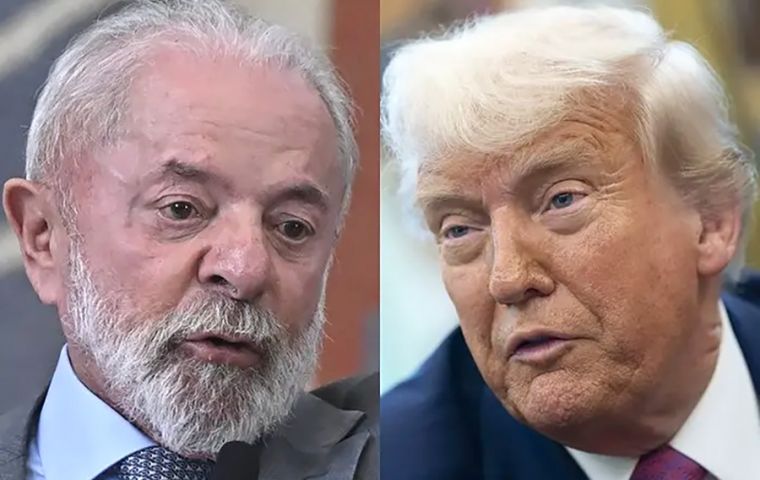MercoPress. South Atlantic News Agency
Lula to invite Trump to COP30
 “A solid partnership is built on mutual benefits,” Lula emphasized
“A solid partnership is built on mutual benefits,” Lula emphasized Brazilian President Luiz Inácio Lula da Silva does not intend to discuss tariffs with his US colleague Donald Trump but will invite him to the 30th United Nations Climate Change Conference (COP30), scheduled for November in Belém.
“I'm not going to call Trump to talk about anything because he doesn't want to talk. But I'm going to call Trump to invite him to COP30 to find out what he thinks about climate issues,” Lula said during the opening of the 5th Plenary Meeting of the Council for Sustainable Economic and Social Development (CDESS), also known as the Conselhão, at the Itamaraty Palace (Foreign Ministry) in Brasília.
On July 9, the US president sent a letter to Lula announcing the imposition of a 50% tariff on all Brazilian products starting August 1. On July 30, Trump signed an executive order mandating the tariff, but excluding nearly 700 products from the list, which takes effect Aug. 6.
Among other reasons, the US government cites what it calls Brazil's “unfair” trade practices in the use of the instant payment system, Pix. Lula countered the arguments by stating that Pix is a national asset and an international benchmark for digital public infrastructure. “We cannot be penalized for developing a free and efficient system,” he said.
“I would like President Trump to try Pix in the United States. He could use Pix to pay a bill, to see that it is a modern thing,” he joked. “And what is their concern? If Pix takes over the world, credit cards will disappear. That is what is behind this madness against Brazil,” Lula argued.
In his speech, the Brazilian president reaffirmed his willingness to engage in dialogue and negotiation, but said that he needs the support of business leaders. He recalled his former vice president, industrialist José Alencar, and told the story of how he was a nationalist businessman who defended the country's interests.
“You no longer have those nationalist business leaders that you had in the 70s, 80s, and 60s. You don't. Today, you have more mercantilists than nationalists. So defending Brazil today has become much more complicated because there are people who think we are mongrels, there are people who don't like to respect themselves,” he said, defending the country's sovereignty on domestic issues.
Lula reaffirmed that political and electoral interests cannot contaminate institutional relations. He referred to Congressman Eduardo Bolsonaro (PL-SP), who, in March, took a leave of absence from the House of Deputies, went to the United States, and is coordinating actions with the US government against the Brazilian judiciary and economy in an attempt to free his father, former President Jair Bolsonaro, from trial for attempted coup d'état. Eduardo Bolsonaro is under investigation by the Federal Supreme Court (STF) because of these actions.
“July 30, 2025, will go down in the history of relations between Brazil and the United States as a regrettable milestone, an arbitrary action such as the one we have suffered. Our democracy is being questioned, our sovereignty is being attacked, our economy is being assaulted. This is a challenge we did not ask for and do not want. No tariff imposed on other countries has ever been accompanied by an attempt to interfere with that country's powers,” Lula said.
According to the Workers' Party (PT) leader, the government will act to ensure that workers and companies are not punished, implementing a contingency plan to mitigate the effects of the tariffs and alleviate their economic and social losses. The president also promised to resort to all appropriate measures at the World Trade Organization (WTO).
The president also defended Brazil's foreign trade policy, with the opening of new markets around the world, and reiterated his promise to sign the agreement between Mercosur and the European Union (EU) later this year. This semester, Brazil holds the presidency of the South American bloc.
“And let the European Union not come and join us now because, after the agreement they made with the United States, signing with us is a glory because there is respect and citizenry in the proposals we made,” Lula said.
Amidst the tariff hike, Trump signed agreements favorable to the US to avoid retaliation. For the European Union, the US raised import tariffs on European countries to 15% on most products – a percentage lower than the 30% initially announced. In return, Europe will not apply the principle of reciprocity. On the contrary, it should eliminate tariffs on US products.
In addition, the EU has committed to investing US$600 billion in the United States, including the purchase of military equipment, and to purchasing US$750 billion worth of energy. No US resources for the European Union have been announced. “A solid partnership is built on mutual benefits,” Lula emphasized. (Source: Agencia Brasil)




Top Comments
Disclaimer & comment rulesCommenting for this story is now closed.
If you have a Facebook account, become a fan and comment on our Facebook Page!